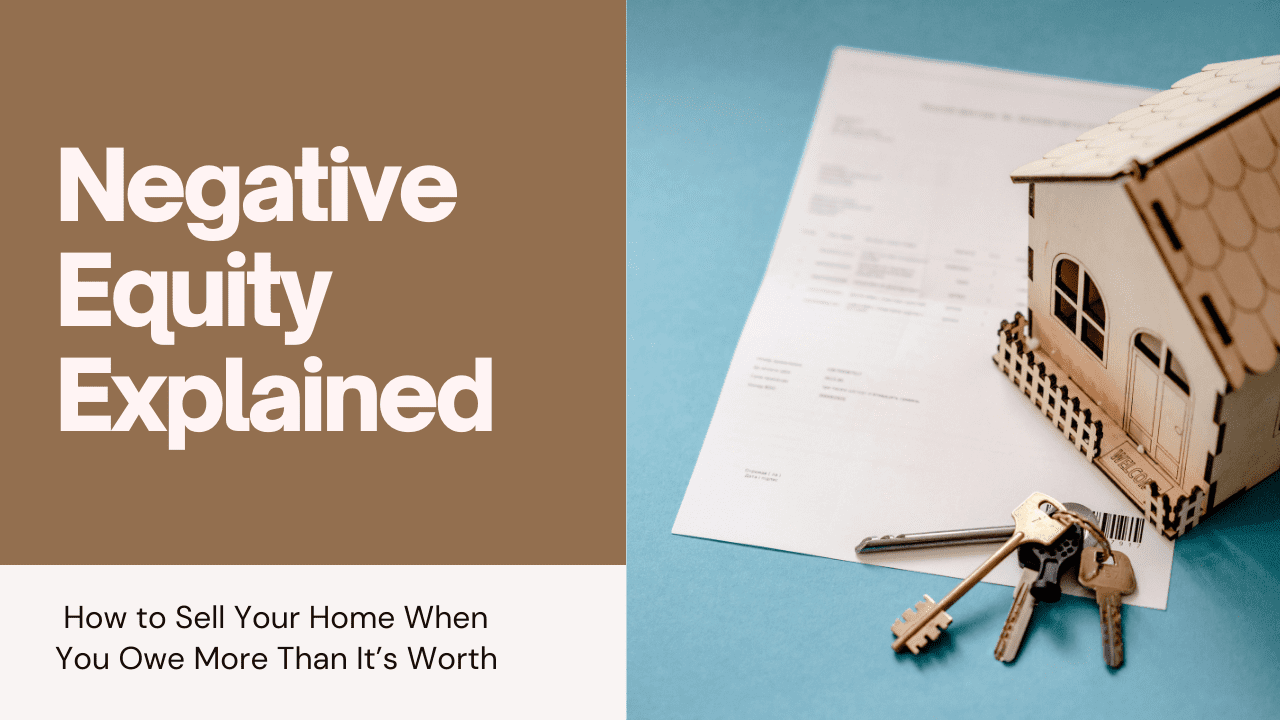If you’re a homeowner in Indianapolis and you’ve discovered that your mortgage balance is higher than your home’s current value, you’re dealing with negative equity. It can feel overwhelming. You might wonder if you can sell, whether you’re stuck, or if there’s any way to move forward without losing more money.
The good news? You’re not alone. Many homeowners face this situation, and there are practical strategies you can use to handle negative equity while still protecting your financial future. In this guide, we’ll break down what negative equity means, your options to sell, and how a trusted homebuyer like KK Buys Indy Homes can offer a hassle-free solution when you need it most.
What Is Negative Equity?
Negative equity happens when the amount you owe on your mortgage is greater than the market value of your home. For example, if you owe $200,000 but your home is worth only $170,000, you’re $30,000 “underwater.”
This often occurs during market downturns, after buying a home with a low down payment, or when unexpected property issues affect its value.
Understanding this concept is the first step toward making informed decisions about selling or keeping your home.
Can Equity Be Negative?
Yes, equity can be negative. Your home equity is simply the difference between your home’s current market value and the balance on your mortgage. When the balance is larger than the value, equity goes into the negative.
This isn’t just a financial term. It impacts your ability to refinance, sell, or build long-term wealth through your property.
What Does a Negative Debt-to-Equity Ratio Mean?
When your home has negative equity, it can also create a negative debt-to-equity ratio. In simple terms, it means your liabilities (the mortgage you owe) outweigh your assets (the home’s value).
For lenders, this ratio signals risk. That’s why it can be difficult to qualify for traditional refinancing or additional loans if you’re underwater.
How to Walk Away from a Negative Equity Mortgage
If your mortgage feels unmanageable, walking away may be an option, but it comes with serious consequences. You might consider a deed-in-lieu of foreclosure or negotiating with your lender. For a clear guide, see How to Walk Away from a Negative Equity Mortgage.
How to Sell a Home With Negative Equity
If you’re wondering how to sell when you owe more than your home is worth, here are your main options:
1. Bring Cash to Closing
One straightforward solution is to pay the difference out-of-pocket when selling. While this avoids complications, it’s not realistic for many homeowners.
2. Short Sale
In a short sale, your lender agrees to accept less than what’s owed on the mortgage. This can help you move forward but requires lender approval and can impact your credit.
3. Loan Modification or Refinancing
If you want to keep your home, some lenders may offer modifications or refinancing programs. However, these depend on your financial profile and current market conditions.
4. Sell to a Cash Buyer
Working with a trusted company that says we buy houses in Indianapolis can provide a fast, stress-free option. Cash buyers often purchase homes “as is,” meaning you don’t need to invest in repairs or updates.
How Much Negative Equity Can I Roll Over?
If you’re thinking about buying another property, some lenders may let you roll over negative equity into a new loan. However, this increases your debt burden and can make your next mortgage more expensive.
Carefully evaluate whether rolling over equity is a wise choice or if selling and resetting your finances is smarter in the long run.
Can Equity Value Be Negative?
Yes, the value of your equity can fall below zero, especially in volatile markets. While this isn’t permanent, it can lock you into your mortgage longer than you planned.
Homeowners in this situation often benefit from considering alternatives like short sales or working with local homebuyers offering a cash offer for a home in Indianapolis.
Subtle But Smart: Selling to a Trusted Homebuyer
When negative equity feels like a financial trap, one of the most convenient solutions is to sell to a professional homebuyer. Companies like KK Buys Indy Homes specialized in helping Indianapolis homeowners who feel stuck.
Instead of waiting months for a traditional buyer, you can request a cash offer in Indianapolis and close quickly, sometimes in just days. This approach eliminates realtor fees, avoids repairs, and provides certainty when you need to move on.
Whether you’re searching for options to sell your house fast or need relief from negative equity, working with a trusted buyer gives you flexibility and peace of mind.
Can Shareholders’ Equity Be Negative?
In business terms, shareholders’ equity can also be negative if a company owes more than its total assets. While this isn’t the same as personal home equity, the concept is similar. Negative equity signals more debt than value.
For homeowners, this comparison shows why addressing negative equity quickly is important to avoid deeper financial strain.
Practical Steps If You’re Facing Negative Equity
- Get a Professional Home Valuation – Know exactly what your home is worth in today’s market.
- Review Your Mortgage Balance – Compare your debt to your home’s value for a clear picture.
- Explore Your Options – Short sales, refinancing, or selling to a cash buyer may be right for you.
- Act Quickly – Housing markets shift. Waiting may increase your debt-to-equity gap.
- Consult a Professional – Financial advisors or real estate experts can guide your decision.
Why KK Buys Indy Homes Can Help
If negative equity has you worried about your future, remember you do have options. At KK Buys Indy Homes, homeowners find:
- Speed: Close in days, not months.
- Certainty: No waiting for bank approvals.
- Relief: No costly repairs or realtor commissions.
If you’re ready to explore solutions, get started with a cash offer for a home today. It could be the most stress-free step toward financial freedom.
FAQs About Negative Equity
Can equity be negative?
Yes, when your mortgage balance exceeds your home’s market value.
How much negative equity can I roll over?
It depends on lender policies, but rolling over debt increases future financial risk.
Can equity value be negative?
Yes. This occurs when liabilities outweigh property value.
What does a negative debt-to-equity ratio mean?
It means your debts are greater than your assets, signaling financial risk.
Can shareholders’ equity be negative?
Yes, in business, negative equity happens when a company owes more than it owns, similar to homeowners with underwater mortgages.
Final Thoughts
Dealing with negative equity is stressful, but it doesn’t have to stop you from moving forward. By understanding your options, whether that’s refinancing, negotiating with your lender, or choosing to sell my house fast to a local cash buyer, you can take control of your situation.
For Indianapolis homeowners who feel stuck, we buy homes fast Indianapolis solutions from KK Buys Indy Homes offer an easy, trusted path to relief. Don’t let negative equity define your financial future. Take the next step today.



































